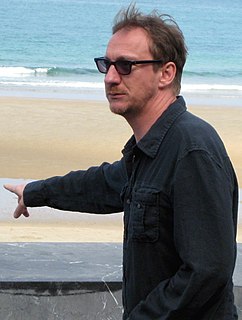A Quote by Robert Lepage
I am interested in suffering and, in particular, the Buddhist idea that in pain, you can find beauty.
Quote Topics
Related Quotes
Pain in life is inevitable but suffering is not. Pain is what the world does to you, suffering is what you do to yourself [by the way you think about the 'pain' you receive]. Pain is inevitable, suffering is optional. [You can always be grateful that the pain is not worse in quality, quantity, frequency, duration, etc]
I think the function of suffering is to let me know that my perception is skewed; what I’m doing is judging natural events in such a way that I am creating suffering within myself. For instance, you have pain over certain conditions, certain situations that occur. And if you just say ‘ok, here I am, I’m going to experience the pain,’ you don’t suffer. The resistance and the degree of the resistance to the natural phenomenon of life causes tremendous suffering.
Pain is not the same as suffering. Left to itself, the body discharges pain spontaneously, letting go of it the moment that the underlying cause is healed. Suffering is pain that we hold on to. It comes from the mind’s mysterious instinct to believe that pain is good, or that it cannot be escaped, or that the person deserves it.
Compassion allows us to use our own pain and the pain of others as a vehicle for connection. This is a delicate and profound path. We may be adverse to seeing our own suffering because it tends to ignite a blaze of self-blame and regret. And we may be adverse to seeing suffering in others because we find it unbearable or distasteful, or we find it threatening to our own happiness. All of these possible reactions to the suffering in the word make us want to turn away from life.
I find that readers are very interested in how things are translated. I just turned in the first part of this father-son Odyssey, and there is a part when I digress and explain that the name Odysseus is related to the word for pain. Like "-odyne" in the word "anodyne," pain. It's the same, "-odyne" as in Odysseus. He's the man who both suffers endlessly, in trying to get home, but also inflicts a lot of suffering on everyone he visits.






































